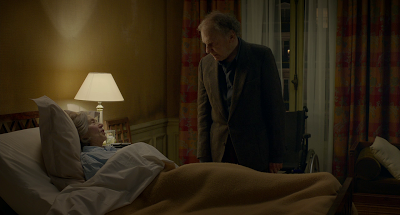AMOUR (LOVE)
A film by Michael
Haneke
2012/ France,
Austria/127 min
12th May ;
5.45 pm ; Perks Mini theater
http://konangalfilmsociety.blogspot.in/
Austrian filmmaker Michael Haneke’s meticulous, superbly
crafted portrait of an elderly couple facing the end of life chronicles a
chapter that many viewers either have experienced or are confronting
themselves.
“Amour” is a tribute to two aging legends of the French
screen and the cinematic tradition they represent. Both actors give complicated
and heartbreaking performances, but Riva’s unstinting portrayal of a composed
and generous woman who knows that everything – her mental clarity, her physical
control and life itself – will soon be stripped from her is absolutely
unforgettable.
“Amour,” while relentless, has compassion not only for the
couple’s struggles and isolation, but also for the fumbling of outsiders. Other
people mean well, but they’re from a world where death remains offstage. Haneke
leaves us with more questions than answers, but I will agree with him that
there is no note of irony in his title.
This is an unforgettable love story set at the close of day,
as tragic and beautiful in its way as “Tristan und Isolde,” and a portrait of
the impossible beauty and fragility of life that will yield new experiences to
every viewer and every viewing.
Michael Haneke
Born in Munich in March 1942, Haneke spent his
early years in a working class suburb of Vienna before an early attempt at fame
as an actor and pianist. Failing to achieve early success, Haneke attended the
University of Vienna to study philosophy and psychology, and became a film
critic and stage director before making his eventual debut as a television
director with After Liverpool in 1973. Setting in motion a television career
specializing in literary adaptations and small screen films, Haneke would work
successfully in that medium until his feature debut with The Seventh Continent
in 1989.Laced with the theme of muted emotions resulting in stark violence that
would become his calling card.
Haneke
took the modern obsession with cinematic violence to a level rarely attempted
in 1997, with the tale of a happy family relentlessly tortured in Funny Games.
Violence is not fun in Haneke's world and this is where his optimism comes into
play. Haneke took home the Grand Prize at the 2001 Cannes Film Festival for The
Piano Teacher, a compelling tale of sexual repression that also won that film's
stars, Benoit Magimel and Isabelle Huppert, the Best Actor and Actress awards
at the festival.He earned some of the strongest reviews of his career for the
2005 thriller Cache.
In
2007 he remade his film Funny Games in English with a cast that included Naomi
Watts, Tim Roth, and Michael Pitt. He scored another international hit with
2009's The White Ribbon, and had arguably his biggest American success in 2012
when his film Amour garnered Oscar nominations for Best Picture, Best Actress,
Best Screenplay, and Best Director, and won the coveted award for Best Foreign
Language Film







No comments:
Post a Comment